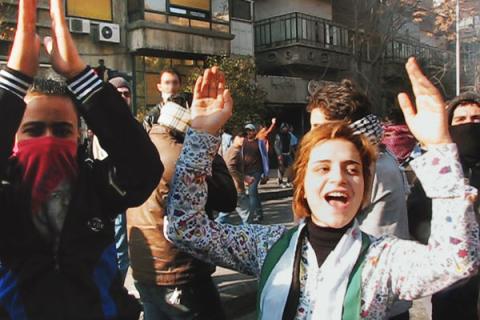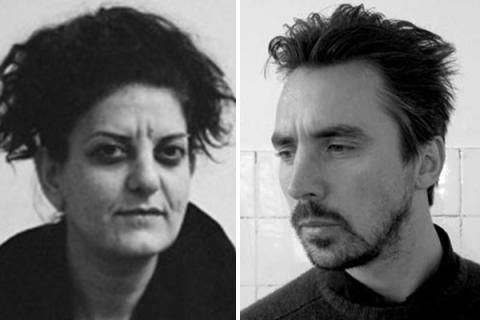
People took to the streets to protest the regime of Syrian President Bashar al-Assad and there was genuine belief that change would come to the land. Change did come. But it wasn't the sort of change many of those Arab Spring protestors hoped for. Instead, civil war, the rise of extremism and a government crackdown has resulted in what's the worst humanitarian crisis of our time (400,000 killed, 11 million displaced, an estimated 500,000 in prison).
Syrian radio host Obaidah Zytoon and her friends were on the streets for all of these changes and their experiences form the basis of the insightful new documentary, The War Room. The film, which had its North American debut at the Toronto International Film Festival (TIFF) recently, follows Zytoon's road trips to the centre of rebellion in Homs, to her hometown Zabadani near Lebanon, and to the north of Syria where they encounter rising extremism. All the while Zytoon and her friends — among them, Rabea, a rock 'n' roll drummer who was found shot through the neck and left in the trunk of his sister's car; Houssam, an architectural student who was tortured to death by Syrian Air Force Intelligence; and Argha, a dental student who spent more than two years in prison for avoiding conscription — are impacted by the effects of the evolving conflict, some losing their lives.
Samaritanmag spoke to Danish filmmaker Andreas Dalsgaard, who co-directed the film with Zytoon, to discuss how dangerous it is to have a camera in Syria, what young Syrian people are like, and what the rest of the world can do to help them.
In your view, what is The War Show about?
The War Show is about a group of friends who live in Damascus in 2011 and suddenly Arab Spring hit Syria and demonstrations start to happen in the street and it's a moment of change, a moment of exploration on many levels. It was a very repressed society where a lot of things were possible where they weren't possible before. This group of friends is affected and they start filming each other and what happens around them. Then you see through the film step by step how Syria descends into war and the kind of development that Syria goes through that has brought it to where it is today and why it is where it is today. While that happens we see it through the story of the friends. We follow the destinies of each of them and none of them are unaffected.
What compelled you to follow this story?
I've always worked very much with cultural dialog and trying to bring the other perspective in a surprising way that defies labels. I thought that this footage was very strong and there was a group of people in the way that they approached life really defied all the labels that people have normally put on Syria so I though it was a very important story to tell.
From a Danish perspective, it's also a desire to show a more human and deep insight to what is actually happening in Syria. And where the rest of the world is deeply affected by the refugee crisis, we see right wing groups benefiting politically from the situation and, I think, there's a deep lack of understanding of the situation the Syrians are in, who they are and what they're fleeing from. And once that's established, there's also a greater sense of responsibility that comes with it.
One of the recurring themes throughout every protest, every piece of combat footage, was how important everyone felt it was to protect the people with cameras. How dangerous was it to be a person with a camera during that time?
The Syrian war, very fast, also became a war between two narratives. Because Syria has always been a very repressed society, it also means there has never been a free media there. And it means that the regime has always been able to control the narrative of the country. With the uprising and with social media and phones and everything that had come into Syria at this time, it opened up the opportunity to create a counter-narrative.
Cameras were the primary weapon in that struggle, which also very fast became something that the regime realized, so they very specifically targeted anyone with a camera in demonstrations. They targeted them by having snipers on roofs, simply taking out people with cameras. That happened often. Also if you were caught with any type of camera the police would empty your hard drive and it would be on your file and whoever was on that camera was also on that file. So it was a very important path to the collection of evidence.
There's something to this which we should understand about how the Syrian regime operates, which is that the primary enemies of the Syrian regime are the moderates. So it's not like that if you're a crazy radical terrorist you'll get in trouble. It's something that they use to systematically map all the moderate activists and target them.
There are points in the film that are very "Syrian young people are just like us," regular young people who listen to Pink Floyd and hang out with their friends smoking joints, who go camping on weekends. How important was it to show how they were just normal young people?
When you express it the way you do and you sit and think about it, it's very obvious. Young people are curious and into cool shit and young people in Syria are not that different from young people everywhere else. So the only reason that this portrait is surprising is because everything we see from the Middle East is channeled through very political frames. That means that everything we see is filmed because of some political interest in the Middle East. We want to portray conflict. We want to portray radical Islamism. We want to follow the situation in a news kind of way.
It means there's a complete disconnect between what we see in Western media from the Middle East and how life on the ground is for most people. And it also helps reinforce an image of the Middle East that is medieval, radical Islamist society that is not capable of change in any way. And that's a narrative that we see in many Danish media and in many politicians on a daily basis.
One of the interesting and perhaps surprising parts of the film was the use of doom saxophonist Colin Stetson to compose the soundtrack. How did that come about?
Between Christmas and New Year's I went back and forth between my own and Obaidah's apartment in Copenhagen, she was living there at the time. Working together with me on the film and at the same time she was live streaming with her hometown Zabadani in Syria. Zabadani in that time had been under siege for three years. In that six months before Christmas they had been cut off from any kind of food supplies. It's a very vicious but very common strategy applied by the regime when they're dealing with rebel areas. People were dying of hunger in Zabadani. And she was live streaming it while her neighbour was dying of hunger. This was, of course, a very tough situation for her and she had a lot of trauma that she had to deal with in that particular situation.
So the way she dealt with it was by playing Colin Stetson. And I came to her apartment one of the days and Colin Stetson was playing on the stereo and we both looked at each other and we said this has got to be the music for the film because this is how we feel inside. Then we approached Colin and told him about the film and why we wanted him in the film and then he went onboard. I'm very, very thankful because I couldn't imagine that film without that soundtrack. It's a very, very particular kind of sound.
What do you hope the film teaches people?
We're hoping that it teaches people, reminds people that there's a common humanity that exists and should exist. It's reminding them by showing a human insight into what has happened in Syria. We're also hoping that this film can help shed light on the issue of detainees. There are hundreds of thousands in Syrian prisons, many of them unaccounted for, so when you're sent to prison you often disappear. Either because you're killed or you just disappear and you can't contact the outside world and the outside world can't get any information about your whereabouts.
It happens with a couple of the people we see in the film as well and there's a situation in Syria where it's hard to define any good strategy of what to do, but we can, in the international community, put pressure on the Syrian government to release prisoners, to let them be accounted for, and that's something that would make a huge difference to Syrian families all over the world who are every day fighting to find any information about their loved ones. So we're hoping this film will shed light on to that because it's a very pressing issue.
As conditions in Syria deteriorate, the radicalization of young men, their attraction to extremism, increases. Is there a cautionary lesson to be learned from this?
Yeah, I think number one cautionary tale there is violence is a very, very bad thing. For every bomb that's thrown, its just even harder to go back to anywhere normal. And only when you have less killing you'll see the ground opening up for different alternatives that we don't see at the moment. Historically, I think the successful revolutions we've seen in the last hundred years have been connected to non-violent movements. And when a revolution, a movement becomes violent it will most often deteriorate into a situation that's even worse and we've most definitely seen that happen in Syria.
If an average person with no connection to Syria sees this film and is moved to help in some way, what can they do?
There are so many different things you can do. Just go online. Doctors Without Borders, Red Cross, find a local Syrian refugee in your town and see how you can make a difference for that person. There's a million things you can do and right now. The U.N. is missing 75 percent of the funding it needs to provide a decent situation for Syrian refugees in neighbouring countries. There's something you can do right there. So I think the thing that's important to say — because looking at Syria maybe it's easy to have fatigue about the situation in some people's eyes about "what can I do?" — but open your computer and look online. There are thousands of people that are doing things. And you can easily be one of them.
Watch a trailer for The War Show
Air Max 1